Key Takeaways
|
What is VoIP and Why it Matters for Modern Communication
VoIP (Voice over Internet Protocol) is a technology that allows you to make and receive phone calls using an internet connection instead of traditional phone lines. It works by converting your voice into digital data packets. These packets are transmitted over the Internet and reassembled on the receiving end into audible sound. This process allows real-time communication over data networks.Here is how it works: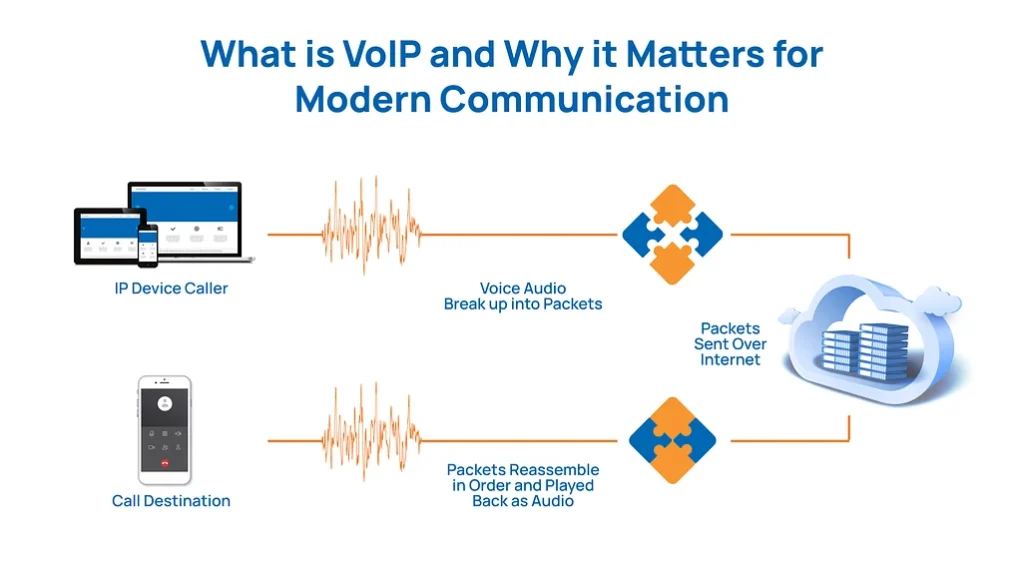
- You speak into a microphone on your phone, computer, or headset.
- The VoIP system converts your voice into digital signals.
- These signals are broken into small data packets.
- The packets travel over the Internet to the recipient.
- The recipient’s device reassembles the packets and converts them back into sound.
VoIP vs. Traditional PSTN (Public Switched Telephone Network)
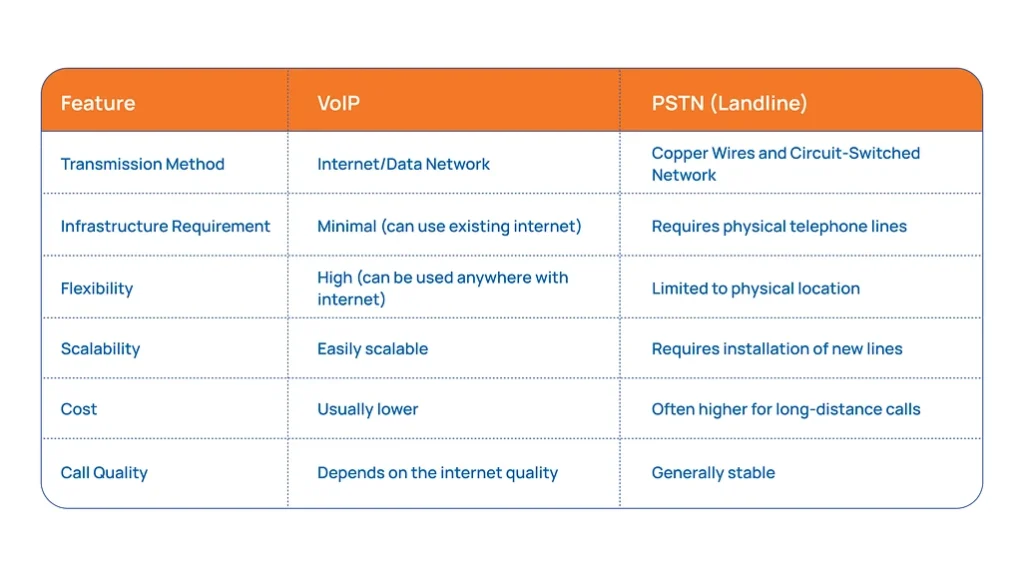
Essential Components of a VoIP Call
Understanding the main components helps clarify how VoIP works:- Endpoints: Devices like VoIP phones, smartphones, or computers that send and receive calls.
- IP Network: The internet connection or local area network (LAN) over which the call travels.
- VoIP Gateway: A device or software that connects traditional telephone systems with VoIP networks, often used when integrating with PSTN lines.
- VoIP Server or PBX (Private Branch Exchange): This system manages call routing, extensions, voicemail, and other features.
- SIP (Session Initiation Protocol): A standard protocol that sets up, manages, and ends VoIP calls.
What is Hosted VoIP and Why is it Gaining Traction?
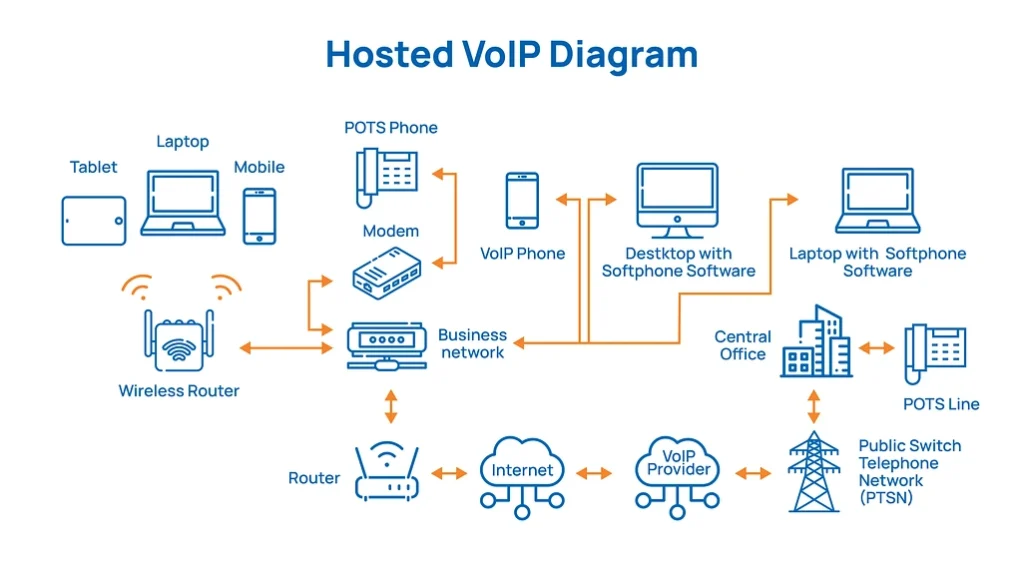 Hosted VoIP (Voice over Internet Protocol) is a phone system that operates online instead of regular telephone lines.
It is called “hosted” because a third-party provider manages the service and infrastructure off-site. This setup allows users to make and receive calls using internet-connected devices such as desk phones, computers, or smartphones.
Unlike on-premise systems that require physical hardware and ongoing maintenance, hosted VoIP relies on cloud technology. The provider handles all technical operations, including call routing, system updates, and server maintenance.
This system is suitable for businesses of all sizes. It supports various features, such as call forwarding, voicemail, conferencing, and integration with other business tools.
Hosted VoIP (Voice over Internet Protocol) is a phone system that operates online instead of regular telephone lines.
It is called “hosted” because a third-party provider manages the service and infrastructure off-site. This setup allows users to make and receive calls using internet-connected devices such as desk phones, computers, or smartphones.
Unlike on-premise systems that require physical hardware and ongoing maintenance, hosted VoIP relies on cloud technology. The provider handles all technical operations, including call routing, system updates, and server maintenance.
This system is suitable for businesses of all sizes. It supports various features, such as call forwarding, voicemail, conferencing, and integration with other business tools.
Growth of the Hosted VoIP Market
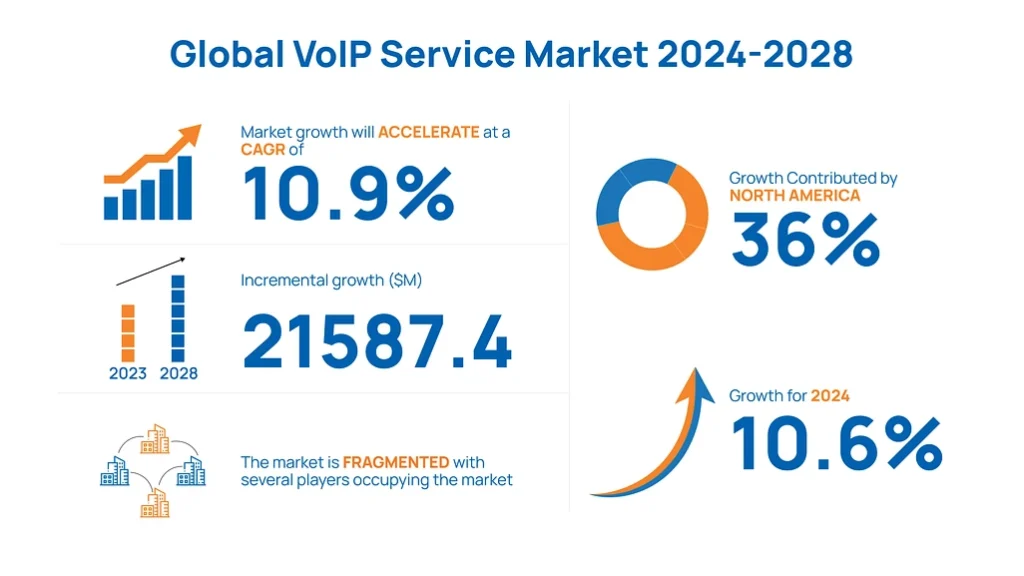 The hosted VoIP market has expanded rapidly in the last decade, driven by increasing demand for flexible and cost-effective communication systems.
The hosted VoIP market has expanded rapidly in the last decade, driven by increasing demand for flexible and cost-effective communication systems.
- According to a report by Global Market Insights, the global VoIP market was valued at over USD 40 billion in 2022 and is projected to reach USD 108.5 billion by 2032, growing at a compound annual growth rate (CAGR) of over 10.9%.
- North America continues to lead the global VoIP market, contributing approximately 36% of the total market growth.
- In North America, the United States dominates the market size by USD 46.57 billion, holding a strong position steadily with a CAGR of 13.9%.
- International VoIP calls constitute the largest segment, making up 58.5% of the market share
1. Technology and Functionality
Hosted VoIP refers to the delivery of voice services over the Internet. It enables users to make and receive calls using internet-connected devices without using traditional phone lines. Hosted PBX is a more comprehensive system that includes call routing, voicemail, conferencing, and other features managed off-site by a service provider. It utilizes VoIP technology to handle calls.2. Infrastructure and Management
Hosted VoIP requires minimal on-site equipment. The service provider manages the core infrastructure, reducing the need for in-house IT support. The provider manages a Hosted PBX, which may involve more complex configurations to support advanced features. It offers greater control over call management and system settings.3. Features and Customization
Hosted VoIP offers basic features such as call forwarding, voicemail, and caller ID. It's suitable for businesses with straightforward communication needs. Hosted PBX is a type of PBX that provides a broader range of features, including auto-attendants, call queues, and integration with other business applications. It's ideal for businesses requiring more sophisticated call handling.4. Scalability and Flexibility
Hosted VoIP is easily scalable, with the provider's platform allowing adding or removing users. It's flexible for businesses with changing needs. Hosted PBX is also scalable, but may require more planning to accommodate complex configurations and ensure seamless integration of new features.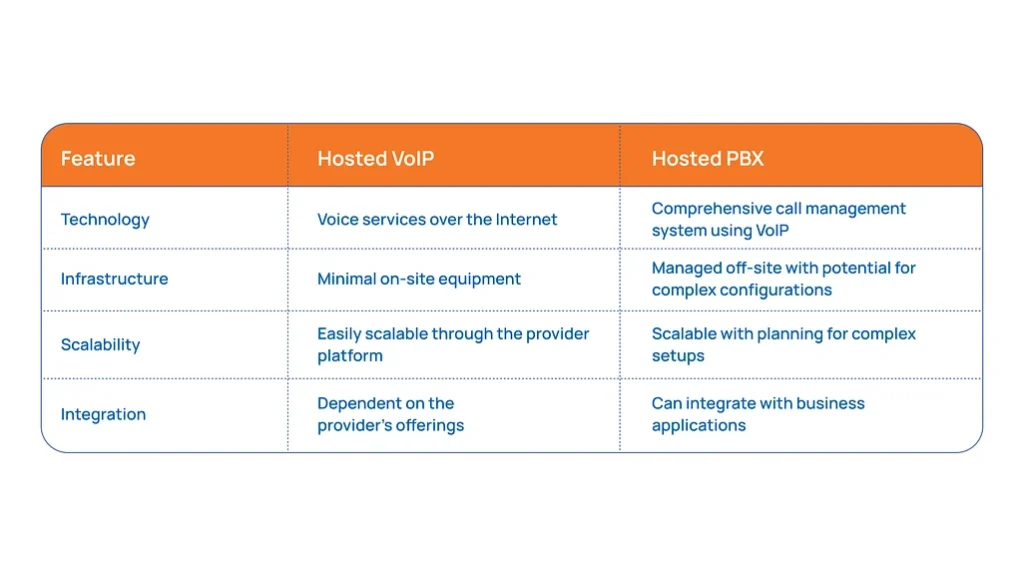
Core Features of Modern Hosted VoIP Solutions
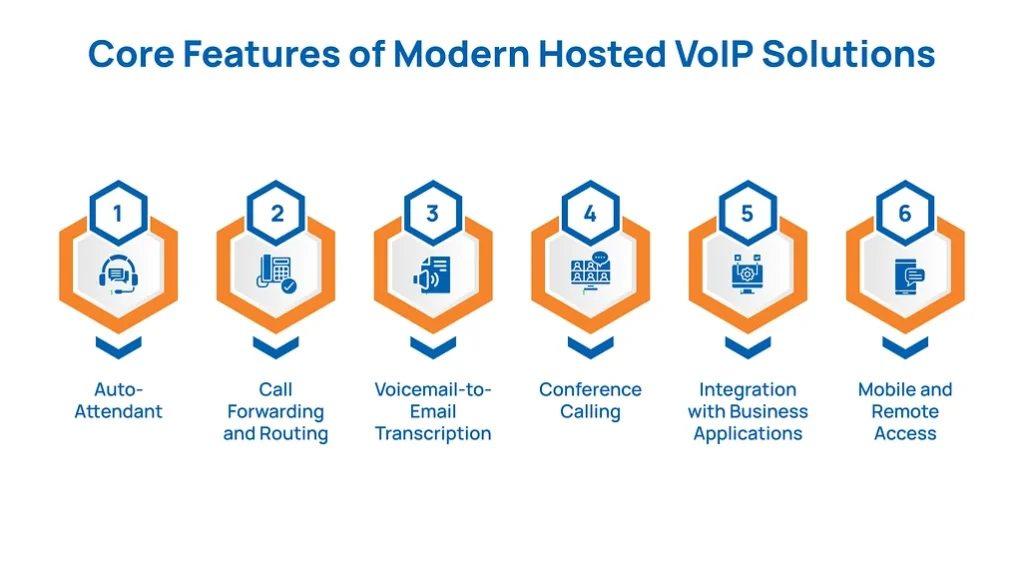 Below are the essential features that make Hosted VoIP a preferred choice for today's organizations.
Below are the essential features that make Hosted VoIP a preferred choice for today's organizations.
-
Auto-Attendant
- Call Forwarding and Routing
-
Voicemail-to-Email Transcription
-
Conference Calling
-
Integration with Business Applications
-
Mobile and Remote Access
How Hosted VoIP Works
 Hosted VoIP systems transform your voice into digital signals and send them over the Internet instead of through traditional copper phone lines. This allows for more flexibility, lower costs, and easier setup, especially for businesses with distributed teams.
Hosted VoIP systems transform your voice into digital signals and send them over the Internet instead of through traditional copper phone lines. This allows for more flexibility, lower costs, and easier setup, especially for businesses with distributed teams.
1. Voice-to-Data Conversion
When you speak into a VoIP-enabled device (like a desk phone, app, or softphone), your voice is instantly converted into digital data. This process uses audio encoding to transform sound waves into a format that can be efficiently transmitted over the Internet.2. Packetization and Transmission
The digital voice data is split into smaller units called packets. Each packet contains part of the audio and routing information that tells the network where it needs to go. Sending voice in packets allows fast, reliable transmission and reduces the required bandwidth per call.3. Data Routing and Delivery
These packets travel over your internet connection to your hosted VoIP provider’s servers. There, the data is reassembled in the correct order and decoded back into sound on the recipient's end. This process ensures smooth, real-time conversations, similar to a standard phone call, but without physical phone lines. Hosted VoIP systems rely on standard protocols like:- SIP (Session Initiation Protocol) – sets up and ends calls
- RTP (Real-Time Transport Protocol) – handles audio data transmission
4. Security & Encryption
Most hosted VoIP providers use end-to-end encryption and secure protocols to protect your communication. This helps safeguard sensitive data, prevents unauthorized access, and ensures compliance with standards like HIPAA or GDPR for regulated industries.5. Remote Maintenance
Because the infrastructure is cloud-hosted, your VoIP provider handles all system updates, maintenance, and monitoring in the background. You don’t need to manage hardware or apply software patches. Everything stays current with minimal input from your team, making it a low-maintenance solution for modern businesses.Hosted VoIP Benefits: What Sets It Apart from Regular Phones
Below are the essential benefits that make Hosted VoIP stand out from traditional phone systems.-
Cost Efficiency
-
Scalability and Flexibility
-
Managed Services
-
Enhanced Mobility
-
Reliability and Uptime
Real-World Applications of Hosted VoIP Solutions
Hosted VoIP systems are widely adopted across various industries due to their flexibility, scalability, and cost-effectiveness. Below are detailed examples illustrating how different sectors leverage Hosted VoIP to enhance their operations.1. Small Businesses: Reducing Communication Costs
Small businesses often operate with limited budgets, making cost-effective communication solutions essential. Hosted VoIP eliminates the need for expensive hardware and reduces call charges, especially for long-distance and international calls. Hosted VoIP offers a range of business benefits, starting with significantly lower operational costs due to minimal hardware requirements, reduced maintenance, and cheaper call rates. It’s also highly scalable, allowing businesses to add or remove lines effortlessly as they grow. Plus, it comes packed with advanced features like voicemail-to-email and call forwarding, often included at no extra cost, enhancing flexibility and functionality.2. Enterprises: Enhancing Global Collaboration
Large enterprises with multiple offices across different regions require seamless communication channels. Hosted VoIP facilitates unified communication, ensuring consistent connectivity and collaboration. Hosted VoIP enables unified communication by integrating voice, video, and messaging across all locations. It offers flexibility for remote access and cuts costs by eliminating the need for multiple providers and expensive hardware.3. Healthcare: Ensuring HIPAA-Compliant Communication
Healthcare providers must protect patient information by adhering to strict regulations like HIPAA. Hosted VoIP solutions can be configured to meet these compliance requirements. Hosted VoIP ensures secure communication through encryption and access controls, streamlining interactions between departments and patients. It also supports compliance with key data protection regulations, making it ideal for healthcare settings.4. E-commerce: Optimizing Customer Support with Advanced Call Routing
E-commerce businesses handle high volumes of customer inquiries. Advanced call routing ensures customers are promptly directed to the appropriate department or agent. Hosted VoIP enhances customer experience by minimizing wait times and efficiently managing queries. It boosts operational efficiency through automated call distribution and scales effortlessly to handle peak call volumes.5. Real Estate and Sales Teams: Enhancing Mobility with VoIP Apps
Real estate agents and sales professionals often work remotely or on the move. Hosted VoIP solutions with mobile applications ensure they remain connected with clients and colleagues. For instance, Many VoIP providers offer mobile applications that allow real estate agents to use their smartphones as an extension of their office phone system. This means you can take client calls, check voicemails, and even participate in video conferences no matter where you are. These examples illustrate the versatility and benefits of Hosted VoIP across various industries, highlighting its role in enhancing communication, ensuring compliance, and reducing operational costs.Why Should Your Business Opt for Hosted VoIP?
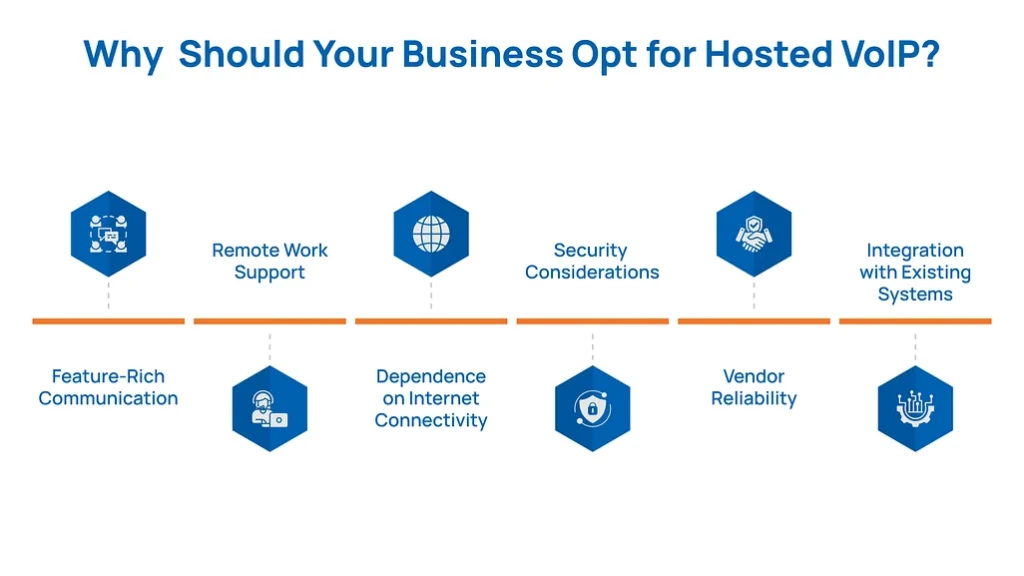 Adopting a hosted VoIP system can offer numerous advantages, but it is essential to assess whether it aligns with your organization's specific needs and infrastructure. Below are essential considerations to help determine if hosted VoIP solutions suit your business.
Adopting a hosted VoIP system can offer numerous advantages, but it is essential to assess whether it aligns with your organization's specific needs and infrastructure. Below are essential considerations to help determine if hosted VoIP solutions suit your business.
-
Feature-Rich Communication
-
Remote Work Support
-
Dependence on Internet Connectivity
-
Security Considerations
-
Vendor Reliability
-
Integration with Existing Systems
How to Choose the Best Hosted VoIP Solution for Your Business?
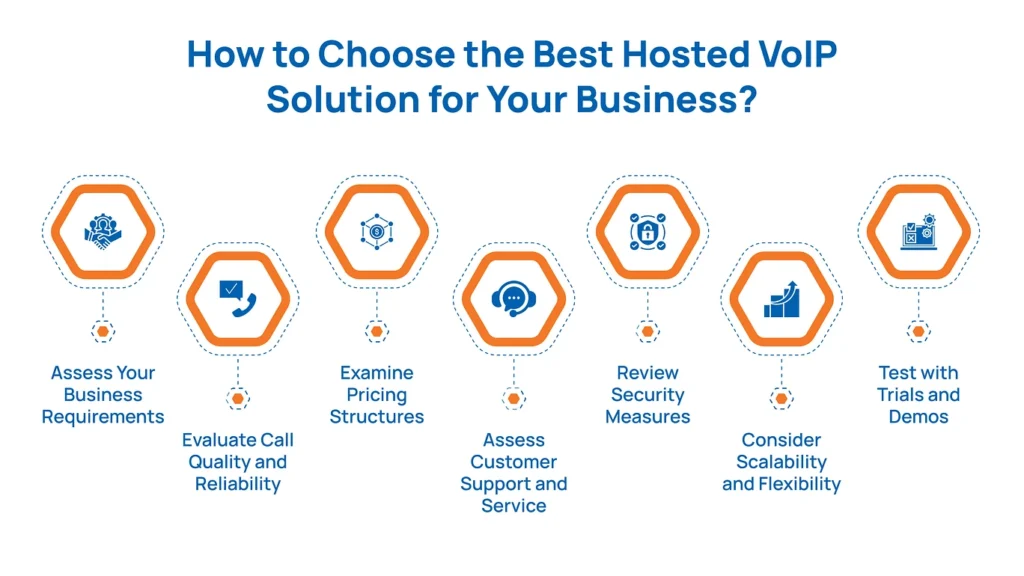 Choosing the right hosted VoIP provider is a critical decision that can significantly impact your business's communication efficiency and overall operations. To make an informed choice, consider the following factors:
Choosing the right hosted VoIP provider is a critical decision that can significantly impact your business's communication efficiency and overall operations. To make an informed choice, consider the following factors:
-
Assess Your Business Requirements
-
Evaluate Call Quality and Reliability
-
Examine Pricing Structures
-
Assess Customer Support and Service
-
Review Security Measures
-
Consider Scalability and Flexibility
-
Test with Trials and Demos
Migrating to Hosted VoIP? Choose PerfectSoft Connect
 PerfectSoft.AI,offers a hosted VoIP solution to smoothly migrate from regular telephony systems. With a focus on minimizing disruptions, PerfectSoft provides comprehensive support throughout the migration process, ensuring that your business operations continue without interruption. Here is why your business should consider opting for our VoIP solutions:
PerfectSoft.AI,offers a hosted VoIP solution to smoothly migrate from regular telephony systems. With a focus on minimizing disruptions, PerfectSoft provides comprehensive support throughout the migration process, ensuring that your business operations continue without interruption. Here is why your business should consider opting for our VoIP solutions:
|
Transform Your Customer Experience with PerfectSoft.AI VoIP Solutions
 At PerfectSoft.AI, we deliver intelligent, high-performance contact center solutions to improve customer satisfaction, boost agent productivity, and streamline operations.
Whether you manage a large-scale BPO, a customer service department, or an outbound sales team, our technology helps you stay connected across all channels while ensuring crystal-clear
We provide advanced VoIP-based Telecom Voice Services that guarantee:
At PerfectSoft.AI, we deliver intelligent, high-performance contact center solutions to improve customer satisfaction, boost agent productivity, and streamline operations.
Whether you manage a large-scale BPO, a customer service department, or an outbound sales team, our technology helps you stay connected across all channels while ensuring crystal-clear
We provide advanced VoIP-based Telecom Voice Services that guarantee:
- High-Quality Voice Calls – Clear and uninterrupted voice communication.
- Reliable Connectivity – Stable and secure connections across all regions.
- Global Reach – Seamless communication with teams and customers worldwide.
Frequently Asked Questions
-
What is the difference between Hosted VoIP and regular landline systems?
-
Is Hosted VoIP secure for business communication?
-
How do I know if Hosted VoIP is right for my business?
-
Is Hosted VoIP suitable for remote teams or hybrid work models?
-
Can I keep my existing business phone number with Hosted VoIP?


Comments